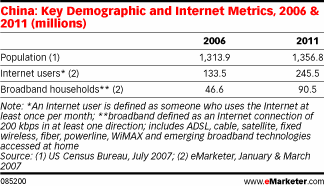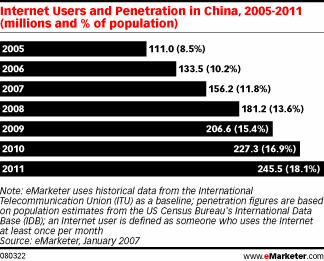"In fact, the lead-up to the Beijing Olympics is likely to be the largest international marketing exercise the world has ever seen, and the fierce competition will extend for decades beyond," says Mr. Macklin. "And one of the most important marketing channels will be the Internet."
While eMarketer estimates that Internet users represented only about 10% (134 million) of the total Chinese population in 2006, the figure will grow to 245 million Internet users in 2011.

Raw numbers, however, do not reveal the numerous challenges that face foreign companies trying to get a foothold in China.
"If there is one important lesson that can be gleaned from the numerous failures of past forays into China," says Mr. Macklin, "it is that doing business in China requires an enormous amount of patience, and a thorough understanding of the local people and business dynamics."
Here are some other lessons about doing business in China:
1. Understand Your Customers — seek out someone on the ground in China who knows what makes the Chinese tick
2. Think Local, Act Local — it may be possible to duplicate some Western marketing strategies when targeting affluent Chinese in the top-tier cities of Beijing or Shanghai, but to target the majority of the Chinese population, a specific and fine-grained local marketing strategy is required
3. Chinese Are Thrifty and Demand Value — the average Chinese consumer saves over 25% of his income, a much higher percentage than his Western counterpart does
4. Chinese Under-30s Are Online — the average Chinese Internet user is young and well-educated and spends a good deal of time every week online seeking and creating information
"The opportunity is vast," says Mr. Macklin. "By the end of the decade, China is likely to overtake the US as the largest Internet market in the world in terms of sheer numbers."
With annual Internet user growth likely to continue to be in the double digits over the next five years, eMarketer expects that China will have some 40 million more Internet users than in the US in 2011 — and that will still represent only 18% of China's total population, clearly indicating there is plenty of room for growth.

eMarketer predicts that there will be over half a billion Internet users in China in 2025.
"Marketers should not make the mistake of considering China as a single, monolithic market," says Mr. Macklin. "Like Europe, China is a rich tapestry of ethnicities, languages, geographies and socioeconomic regions."





